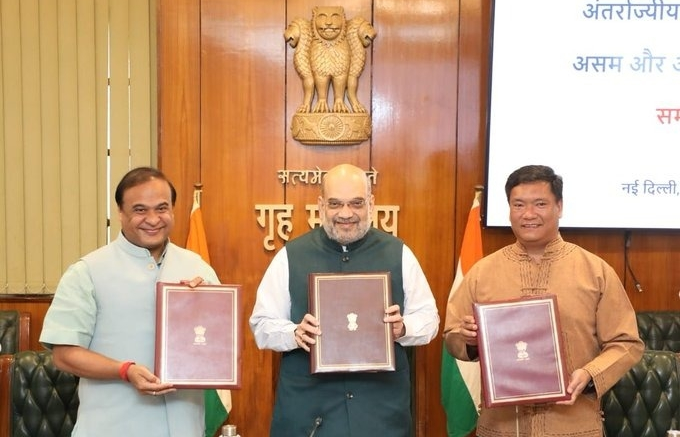Assam and Arunachal Pradesh on Thursday signed an agreement to settle the long-pending disputes along their over 800 km border.
Assam Chief Minister Himanta Biswa Sarma and his Arunachal Pradesh counterpart Pema Khandu signed the agreement in presence of Union Home Minister Amit Shah in New Delhi.
After signing the deal, Shah said that they all have witnessed a historic moment in the northeast to resolve the border dispute between Assam and Arunachal Pradesh, pending for decades.
He said that the report of the Local Commission on this dispute kept circling around for decades, but now been accepted by both the states and Thursday’s agreement would prove to be a milestone in the direction of realising Prime Minister Narendra Modi’s dream of a developed, peaceful and conflict-free northeast.
Union Law Minister Kiren Rijiju, the Union Home Secretary and senior officials from the Centre and both the states were also present on the occasion.
Shah said that since 2018, the Centre, under the leadership of Prime Minister Modi, has signed several accords including for Reang refugee settlement in Tripura, and several to end violence in the northeast.
He said that as a result of these peace agreements, so far more than 8,000 armed militants have shunned violence and joined the mainstream. Compared to 2014, there has been a 67 per cent reduction in incidents of violence, 60 per cent reduction in the number of deaths of security forces and 83 per cent reduction in the number of civilian deaths in the northeast, which is a big achievement of the government under the leadership of Prime Minister.
The Modi government has withdrawn AFSPA from many places in the northeast, he added.
Around 70 per cent police stations in Assam, 15 police stations in 6 districts in Manipur, all but 3 districts in Arunachal Pradesh, 7 districts in Nagaland, and entire Tripura and Meghalaya are now free from Armed Forces (Special Powers) Act.
Shah said that due to the efforts of the Modi government, all-round development is visible in the entire northeast today and this entire region is on the path of progress.
Thursday’s agreement between the two states would end the dispute relating to 123 villages along the border, keeping in view the historical perspective, demographic profile, administrative convenience, proximity to the border, and the aspirations of the residents. Under the agreement, both the state governments have agreed that this agreement would be final with regards to these 123 disputed villages and neither state would make any new claim related to these areas or villages in future.
After the agreement, a detailed survey would be carried out by the Survey of India in presence of representatives of both state governments to determine their boundary.





















